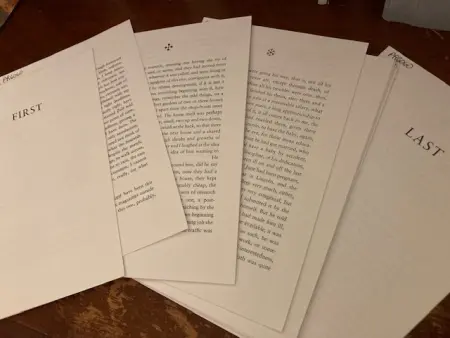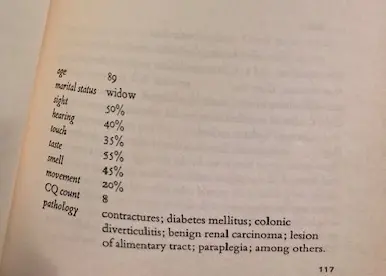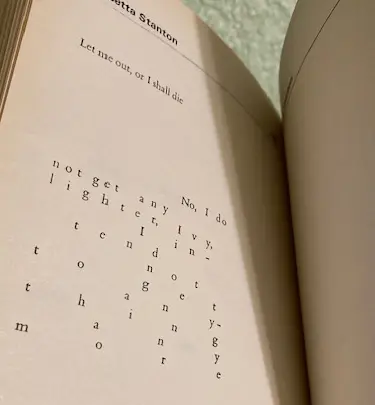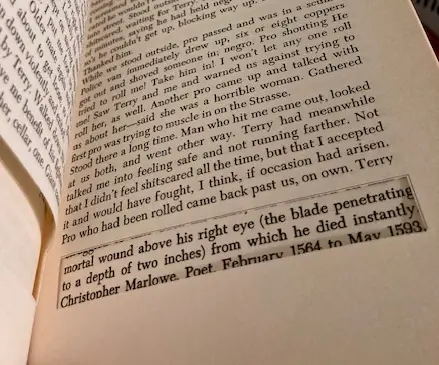Photos by Peter Derk
When this column started, it was mostly about the unusual formats B.S. Johnson used to tell stories: cut-outs mid-story, shuffled chapters, and other oddities.
This was an idea I pitched before I knew Johnson died by suicide.
Whenever you look into a writer who died by suicide, when you know how the writer’s story ended, you look at his work through his ghost, a barely-there image that hovers over each page.
For now, let’s stick with the books. Because they are unusual, interesting, and unique in ways worth talking about.
Then we can get back to Johnson.
"The Unfortunates"
If you buy a copy of The Unfortunates, you’ll get a book-sized box, which holds 28 separate pamphlets.
One pamphlet is an introduction to the book by Jonathan Coe, one pamphlet is labeled First, and another is labeled Last.

The other 25 are stapled pamphlets, ranging from a single page to something like 15 pages at the longest. The pamphlets don’t indicate any order, and instead each has a symbol on the top of the first page. Each pamphlet starts with page 1.
You’re meant to read the pamphlets in any order with the exception of the first and the last. In fact, the order you read them in and the order someone else reads them in are meant to be different.
The story contained within and between the pamphlets is about a guy who is headed to a town to cover a football match. When he arrives, he realizes that the town he’s traveled to is one he visited a few times to see a friend who was dying of cancer.
It’s a sad, hard-grip story that focuses somewhat on the friend, but also the narrator, his memories, his trivial thoughts, his lunch, the loves of his life.
The idea behind the book’s construction is that this is what it’s like to remember, to walk through a town where a friend died a slow, painful death. The book is meant to replicate the way memories and emotions come in flashes.
It’s not linear because memory is not linear.
Part of B.S. Johnson’s aesthetic was that he felt novels shouldn’t tell goofy little fictions, and instead should be used to tell true stories. And The Unfortunates does that. By re-creating memory this way, The Unfortunates cuts through the bullshit that comes with a writer recalling things and putting them in a tidy order, as though that’s the way they think all the time, from A to B.
"House Mother Normal"
House Mother Normal is the story of events in a nursing home. The same events are described by several different residents. As you go through the book, you get the same story again, but from another angle.
You're introduced to each narrator by a set of stats that relate each resident's sensory abilities, cognition, and other potential issues, sort of like what'd be on the back of nursing home baseball cards:

The narrators are ordered by, basically, ability to relate the story. The most coherent story is first, and as you go through the book, the narrators become more and more difficult to follow:

Instead of a linear narrative, A to B, Johnson creates a layered narrative that goes from A to B, then lays another A to B on top of that one, and so on.
The reader sees something confirmed a number of times, and the reader then assumes those things really happened. Other things are not confirmed, and seem to possibly be made up, or the products of confused elderly folks, or perhaps some events are unconfirmed because only one person noticed.
It’s a little like reading a mystery where you’re trying to piece together what really happened, and all you have is the very imperfect, inconsistent memories of a group of humans.
"Albert Angelo"
Albert Angelo is a teacher, and the book is sometimes in first person, sometimes third, sometimes filled in with essays by Angelo’s students, which give us an idea of their opinion of Angelo.
There are also cutouts in a few pages of Albert Angelo, which let the reader see into “the future” of the book. Or maybe take apart the idea of linear narrative.

Albert Angelo ends with a coda where Johnson sort of explains why he wrote the book, and it contains what is probably his most famous quote: Telling stories is telling lies.
We’ll get back to stories and lies.
Albert Angelo feels, to me, like it’s giving us a window into what’s about to happen because, as the writer, Johnson knew everything that was set to happen, so why shouldn’t the reader?
Why The Gimmicks?
I think what B.S. Johnson’s books have in common is that their gimmicks make them less like reading experiences, more like writing experiences.
You’re more in Johnson’s head than your own at times.
In other words, they replicate what it’s like to be B.S. Johnson, as opposed to creating a narrative for the reader.
These are books where the author is very present, very much in the room with the reader.
When I read these books, I read stories where a writer is desperate to be understood.
Where I Toe The Line
From Wikipedia:
Johnson became depressed by his failure to succeed commercially and by mounting family problems. On 13 November 1973, aged 40, he took his own life by slitting his wrists.
Sometimes I overexplain things. This is something my partner has pointed out to me, that it can feel, talking to me, like I’m treating the person listening like a dolt, making analogies that aren’t necessary.
I do this because it’s important that I feel understood. Not just on a surface level, but more deeply. I want to try and make sure that I’m being heard, completely.
I just want the person I’m talking with to understand everything in my head.
Reading B.S. Johnson, I feel a kindred spirit at work. Someone who wants to be understood, someone who goes to unusual lengths in the attempt, is someone I can relate to.
And I wonder about B.S. Johnson. I wonder if his commitment to truth, his move away from fiction that told fanciful stories, put him in a box.
It’s not always hard to write from the heart, but it’s hard to sell from the heart.
It’s hard when you try and sell something deeply personal and then watch readers clamor for goofy vampire romances or contrived thrillers.
I do not hate vampire romances or thrillers, by the way. It’s just...It’s a perilous thing to put your real self into the world and then see, in such an objective way, the public indifference to you and your stories.
I wonder if the box B.S. Johnson put himself in was one where he wrote books to be understood. And when those books didn’t sell very well, it meant that very few people understood him.
Most of us don’t have to go through life with an objective proof, numerical evidence, that most people are indifferent to us, our lives, and everything that's important to us.
B.S. Johnson lived that reality.
Why Johnson Is Worth Reading
I enjoyed the novelties of Johnson’s books, and those are what brought me to his work. But I was affected by the stories.
The feelings weren’t always, or usually, pleasant, but they were vivid, striking, clear.
B.S. Johnson’s books bring most of what we want from a reading experience. They bring something new to the table. They go out into uncharted territory. And they tell a good story that hits the reader hard.
B.S. Johnson wouldn’t be my first choice to read on an airplane or while commuting. The narratives are a little messy and ask your full attention.
But when it comes to sitting down to read a book, you could do a lot worse than Mr. Johnson.
In a recalled conversation with his dying friend, Tony, in The Unfortunates, the narrator relates this:
…I said, it was all I had, what else could I do, I said, I’ll get it all down, mate. It’ll be very little, he said, after a while, slowly… That’s all anyone has done, very little, I said.
That’s all most of us who write are looking for. Maybe one or two small, but good, stories out of an entire life.
B.S. Johnson might have died feeling like he'd done very little.
But the very little he did is well worth your time.
Get The Unfortunates by B.S. Johnson at Bookshop or Amazon
Get House Mother Normal by B.S. Johnson at Bookshop or Amazon

About the author
Peter Derk lives, writes, and works in Colorado. Buy him a drink and he'll talk books all day. Buy him two and he'll be happy to tell you about the horrors of being responsible for a public restroom.







